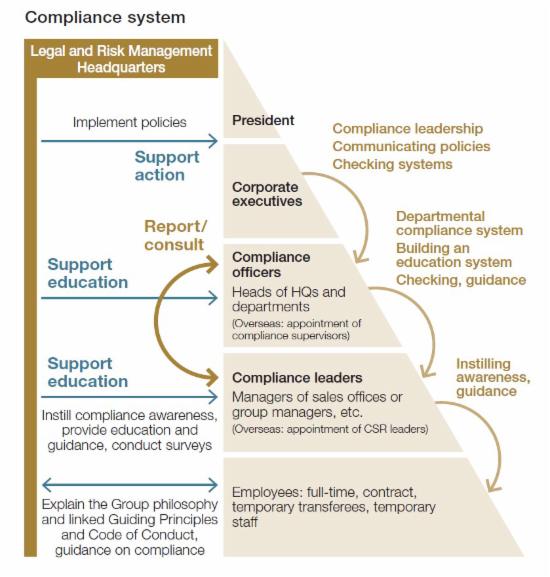Compliance
As part of our efforts to fulfill our basic responsibilities as a member of society, we strive to establish a compliance and internal control system for the entire azbil Group in all our operations in Japan and abroad.
Corporate Guiding Principles and Code of Conduct
The azbil Group Guiding Principles act as guideposts to steer corporate behavior for the purpose of realizing the Group philosophy. Originally established with a focus on the corporate ethics held by the Group until now, the principles were revised to take into account the changing times, shifting that focus by incorporating factors such as globalization, diversity and inclusion, and the United Nation’s Sustainable Development Goals (SDGs). The azbil Group Code of Conduct are standards that emphasize corporate ethics and define the behavior of officers and employees.
azbil Group philosophy, Business Guiding Principles, Code of Conduct
Aiming to practice our Group philosophy for achieving a sustainable society, the azbil Group has created the azbil book (azbil Group philosophy and Guiding Principles) and the code of conduct book (azbil Group’s Code of Conduct) and distributed them to employees to deepen their understanding.For global employees,we have translated these publications to ten languages and distributed them globally.Besides, we have an annual education program for employees on the azbil Group Guiding Principles and the azbil Group Code of Conduct through e-learning.

Promotion system, initiatives
The azbil Group has established a new Legal and Risk Management Headquarters to further strengthen its system for promoting compliance and enhance collaboration between the Legal Department and CSR and Risk Management Department. The azbil Group has a compliance system where a corporate executive is appointed to drive and oversee global compliance efforts, as well as compliance officers, as shown in the chart below. Compliance leaders (overseas called CSR leaders = CLs) are responsible for promoting compliance in the workplace, identifying problems, and reporting to compliance officers.

Maintaining and increasing compliance awareness
The azbil Group conducts annual compliance training for officers and department heads by external experts, and the officers and department heads spearhead efforts to improve awareness of compliance throughout the Group (287 participants in FY2023). We also conduct training for compliance officers and leaders with in-house instructors (with 733 participants in FY2023), implement annual e-learning on compliance for employees (with 6,401 participants in FY2023), and hold group discussion training (for half our employees every year, 3,164 participants in FY2023), and make sure to share the topics at that time to further promote awareness. Overseas, regional CL meetings are held regularly to raise the level of CLs, in addition to annual e-learning. In addition, we conduct an annual survey of all Group employees about the status of compliance within the Group, which helps us understand the level of understanding and identify any problems that need to be tackled so that we can implement the necessary countermeasures.
Preventing Legal Risk
The entire azbil Group strives to ensure complete compliance with external laws. In addition to promoting full legal compliance in business activities, the Group provides education related to the law and also addresses legal risk overseas, which is increasing as our global expansion accelerates. Every effort is made to ensure timely and appropriate response to important laws and associated matters, as we endeavor to prevent problems from occurring.
Efforts on Anti-Corruption Practices
Policy
The azbil Group, stipulating "Compliance with Fair Trade and Prevention of Corruption" in its Group Code of Conduct and recognizing that preventing corruption as one of the most critical management issues in achieving a sustainable society, has established “The azbil Group Basic Policy on Anti-corruption Practices" based on the Group Code of Conduct. Our efforts include preventing all forms of corruption, such as "bribery", "excessive entertainment and gifts", "giving or receiving unfair advantage", "conflicts of interest", "insider trading" and "inappropriate political/administrative association". This policy has been approved and resolved by the board of directors of Azbil Corporation. A system has been established to ensure proper oversight of activities based on this policy, monitored by the board of directors through audits and other means. This policy applies to all officers and employees of the azbil Group and is available in Japanese, English, and Chinese to ensure awareness of the policy throughout the Group. Additionally, the Group Code of Conduct and this policy are posted on the azbil Group's website and the intranet portal, making them accessible to all officers and employees at any time.
The azbil Group Basic Policy on Anti-corruption Practices
System and Initiatives
Efforts to prevent corruption are included in the annual CSR activity plan for the entire azbil Group as one of the compliance activities. The CSR activity plan is formulated through the azbil Group CSR Promotion Committee which is headed by the CSR executive officer of Azbil Corporation and which includes responsible department heads for CSR themes and CSR officers of each group companies. Results of these activities are reported to the management meetings and the board of directors of Azbil Corporation.
In planning and implementing specific initiatives to prevent corruption, we assess corruption risk annually based on various factors such as country, region, business area and the Corruption Perceptions Index (CPI) published by Transparency International. We also grasp the situation and identify any issues related to anti-corruption practice with an annual survey among all employees regarding compliance status and awareness. Based on these results, we implement necessary measures, including further investigations and audits by the legal department, audit department and so on, as well as guidance and education on strengthening or improving anti-corruption practices for local subsidiaries and business areas which are deemed high-risk.
In our relationships with all stakeholders, including new and existing contractors, we include compliance clauses related to anti-corruption practices in basic transaction contracts and so on, encourage their consent to the clauses and ensure their commitment to compliance during the contract period. Moreover, our "azbil Group CSR Procurement Guidelines" stipulate prohibition of bribery, excessive gifts and entertainment, corruption, extortion, and embezzlement, as well as prohibition of the exchange of valuable items to obtain a business opportunity or inappropriate benefits. We conduct information sessions for key business partners to promote prevention of corruption within their organizations.
And in FY2023, there was no staff disciplined or dismissed due to non-compliance with anti-corruption policy. The cost of fines, penalties or settlements in relation to corruption in FY 2023 was zero.
Education
In azbil Group, we implement education on prevention of corruptive actions to all employees. Domestically, we implement e-learning and reading sessions on the azbil Group Code of Conduct for all employees, and comprehensive education on preventing corruption, primarily focusing on bribery prevention, is provided during annual compliance training to enhance understanding of anti-corruption practices. Additionally, new expatriates receive training on the overview of anti-corruption laws in the host country before their assignment.
For overseas subsidiaries, the concept of anti-corruption practices which mainly focuses on bribery is included in the annual compliance training which is implemented to all employees, and necessary education and discussions on preventing corruption are conducted as necessary in Regional Compliance Leader (CL) Meetings regularly held. Furthermore, based on the risk assessment results mentioned above, we conduct investigations to confirm the latest situation and implement education on preventing corruption to local subsidiaries located in countries and regions which are identified as having high corruption risks or where their relevant laws are changed.
- SDGs Initiatives
- CSR Management
- Fulfilling our fundamental obligations to society
- azbil Group Contribute to Society
- azbil report (Integrated Report)
